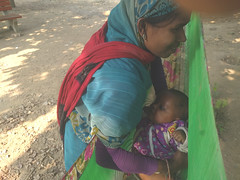Was the Film ‘Eat Pray Love’ Culturally Relative About Women’s Rights?
by Rita Banerji
‘Eat Pray Love’ was showing in theaters in India about two weeks ago, and I have to admit, that like most here, I too went to see it just to see how the country looks on the big screen. But the one question that’s been nagging at me since is, “Why did they have to get Tulsi married?”
The seventeen-year-old Indian girl, Tulsi, who Liz Gilbert befriends at the ashram, has a colorful wedding in the film, which she does not in the book. True, films often distort their source to suit the audience’s whims. And a Bollywood style wedding would certainly spice up the visual appeal. Yet I found Tulsi’s wedding to be a symbolic slaughter of the spirit of this book; a mockery of one of its core issues.
Since Liz already travels, explores and writes, doing all she truly loves, what was her big soul-searching journey all about?
In her own words: “I don’t want to have a baby,” an issue she wrestles with incessantly. “That deadline of THIRTY loomed over me..and I discovered I did not want to be pregnant.” And again, “I well know what desire feels like. But it [the desire for a child] wasn’t there.” Her real concern about motherhood, it seems is how she would be perceived if she openly admitted she didn’t desire children. She agonizes over how people would “judge” her. “What kind of a person does that make me?”
The women’s movement in the west may have promulgated birth control, abortion rights, and certain sexual freedoms, but the fact is there persists an under-handed control over women’s bodies and sexualities. The presumption, as amply evident in every form of media, is that giving birth is the ultimate fulfillment of femininity. It is what every woman apparently craves and plans for. And what about those who don’t? Would they like George Clooney be judged as free-thinking spirits, who follow their convictions and for that are all the more sexy and desirable? Certainly not. Such a woman is either in denial of her natural yearnings, or she is a bitter, insensitive specimen of womanhood, who is incapable of deep love and care.
Happily Liz is able to thumb her nose at this model by discovering both feminine fulfillment and deep love in her wonderfully caring Brazilian boyfriend, who much to her relief not only has a vasectomy, but as she admits later in an Elle interview, he “doesn’t want me to do any of the things I don’t want to; he doesn’t want me to be a mom.”
This is why Tulsi provides such an interesting parallel to Liz. They are essentially the same personalities, two women wanting the freedom of their bodies, the choice of expressing their sexuality their way. We see this in Tulsi’s vehement resistance to the idea of marriage, her confiding in Liz that her family considers her different and difficult when what she really wants is to “roam like you,” and her lamenting, “Why was I born an Indian girl?” The difference is that where Liz’s prison is virtual, her choices locked in the confines of her mind, Tulsi’s prison is the actuality of the family and culture she was born into. It is her family’s prerogative to decide which man Tulsi will share her bed and her life with, even if he is a complete stranger to her, and her husband will decide when and how many children she will have.
Within my own circle of family and friends I have seen too many women forced into marrying men they did not want to or desire to. One woman shaved her eyebrows on the day of the wedding. She was beaten, her eyebrows were painted on and she was marched to the altar. Another woman hid in her room for days, went on a hunger strike and sobbed the entire time. Her relatives bombarded her with guilt and emotional blackmail, till she finally relented. And every few days a young woman is gang-lynched for daring to choose who she wants to love – the so called “honor killings.” But by and large girls in India are raised to submit to this eventuality of their lives, without kicking up a fuss. Even if it is the worst kind of rape, the kind in which your own family is complicit.
That is why for me, Tulsi’s spirit of resistance was unusual and inspiring. And no doubt that Liz recognized this too. After all, isn’t there a global agenda in the women’s struggle for autonomy over our bodies? Of all the women Liz met in India, she chose to present Tulsi. She observes her to be “un-Indian,” and she does not end the encounter with Tulsi’s wedding, like in the film, where Tulsi looks like a sad little monkey, on a collar and leash, performing a dance mechanically. No, the last we see of Tulsi in the book, she is running in circles yelling out, “I want to live in Hawaii.” That is the dance of real freedom. That is what Liz wishes for her friend. In the movie, we see Liz advising a very miserable looking Tulsi, in bridal gear, to learn to find happiness in the penitentiary she has just been committed to. Isn’t that a mockery of her truth? A ridiculing of the quest that set Liz across the globe?
First published on Pickled Politics
© Rita Banerji. All Rights Reserved.
ABOUT THE AUTHOR
Rita Banerji is an author and founder of The 50 Million Missing Campaign. The research for her book Sex and Power: Defining History, Shaping Societies (Penguin 2009), provided the impetus for the founding of this campaign. To know more about visit her website www.ritabanerji.com

















Hi Rita,
A very interesting read! I think what is nagging at me right now, is the idea of women “resisting” somehow being “un-Indian”. The Liz-Tulsi dynamic for me just reinforced the assumption of white western feminism that the third world women are necessarily oppressed victims of patriarchy who must be saved from their culture, whereas white women are already modernized, have control over their bodies and can make “autonomous” choices.
Yes, while we can think of countless cases of where an Indian woman/girl has been forced into marriage against her wishes, what about recognizing the many ways that these very women resist? I think it’s a shame when “women” and “resistance” are somehow appropriated to be a western phenomenon. All it does is reinforce the stereotype of Other women as passive victims.
@Richa, Unfortunately, even at the 50 Million Missing Campaign we often find tremendous passivity among women. Even women with education, job etc. Just an unwillingness to fight culture or even individually engage with it. We are identifying it as a key problem actually. Just go through this blog and posts. It’s is what this whole campaign is about — the systematic annihilation of women in India. How has it got to this stage of such massive, mass slaughter? 50 million females killed in 3 generations! It is unprecedented for any human group in history. There were 6 million Jews in Europe.
It seems though what the book tries to show — is the spirit of resistance and non-conformity in Tulsi. In a way that’s what Liz is observing. That just as she is fighting within her cultural context for the freedom of her body, Tulsi is fighting the same fight in context of her culture. And the film actually does not honor that message. That’s what is so unfortunate here.
And yet in a way you are right too. Because, how many women fight the fight that Liz is fighting in the western world. On t.v. etc. we get news of such and such Hollywood female star having children at 40, and this whole issue around women not conceiving and dying to conceive — like their whole life and existence depended on it. Do we see anything about American men or Hollywood male actors getting all hyper about not having or being able to have children?
After reading your jounal, I realize that there are many misfortune women in our life. To myself, I am wondering when inequality will end. However, we are living in the world which is improving day by day. Maybe, now we don’t know how the results is, but I belive one day our women will have voice in this world. Tusi is an exmample, she started raising her voice.
So true. What really gets me is that this happens in most of the families here. Despite all the so called ‘education’ advancement we are still where we used to be hundreds of years before especially on the issue of marriage and a girls choice. What a waste.
keep fighting the good fight, ….
The rotten politics of control over the weak persons is prevailing in the world. Women are suffering from this political control. Owing to this political exploitation the social and economical exploitation occurs. Women are the means of save generations. When women will stop conceiving child the human generation would fall in risk. So stopping pregnancy is not the solution of making women independent. We have to fight for equal rights and dignity of a women at their family as well as in the society i.e. all sphere of life. Culture grows year after year. There are some good and bad things. We should follow the good things, make the good things stronger and get rid of bad things.
@Shamsun — The idea here is not telling women to stop having children. Rather the idea is that childbirth is every woman’s individual choice. If a woman does not want to marry and/or have children that is her individual option. We have to stop treating women’s bodies and wombs like social commodities that their families own and control.
Rita
I agree with what you are saying that the wedding was a betrayal of the book. But that also shows that this is not just about gender. Hollywood decided that one sort of woman could be free, but another not.
Which is also what struck me about the film. I, as a male and an environmentalist of sorts, saw not a woman finding freedom, but a western tourist traveling the globe as an uber-consumer, trying to fill her existential lack through whichever orifice was convenient at that point in time.
I think that gives a clue to the problematic of the film, one may, in promoting the freedom of women, end up at a libertarianism that is utterly compatible with the laissez faire of economics. Which is fine on a personal level, but also has wider social consequences, something I find poorly thought through in Swedish feminism for instance.
Hi Daniel,
Actually the film’s portrayal of the Indian wedding is about gender, but in a cultural context. Ultimately a woman’s freedom and choice is an individual issue — however she chooses to use it. And that is what the film does not respect. It assumes that freedom and choice is an entitlement only of western women. Well, I understand where your second point is from. Sadly enough — the film distorted this too. When you read the book — you realize that the woman Liz begins her journey with a very simple question. She challenges the social construct of what a successful woman’s life is supposed to look like, and what one should do or not do. She asks, “What do I want to do?” And she visits the 3 places she does for very specific reasons — which the film does not address. Instead it comes across like you say — consumerism, with no purpose.
Thanks Rita Je,
It’s a nice article, what i want to say, you already taken every point to be noticed by an Indian women. It’s a bad luck, only few of them are aware about internet, they can’t read it. No media is going to be expressed in the case of Genocide. Those, who are fighting for the causes are sidelined by the majority of Men dominated society. Further, bad luck of Indian mentality is that: they would not like to follow the advises of Activits, till the girl or women of their family has not married. After marriages the experiences are alike in majority of society. It is further a bitter truth — the families who don’t have any girl child would never be aware of the desires and wants of a girl. In many educated families, it has felt insulted if their daughter’s deny for marriage.
Dear Mr. Singh,
You are right. It is one thing that we have to address in how even educated families in India think. Many think that the most important thing for a daughter is to get married, otherwise the family loses its name. But this change has to start with the educated, internet savvy classes of India before we can take it to others. This is the challenge of this campaign.